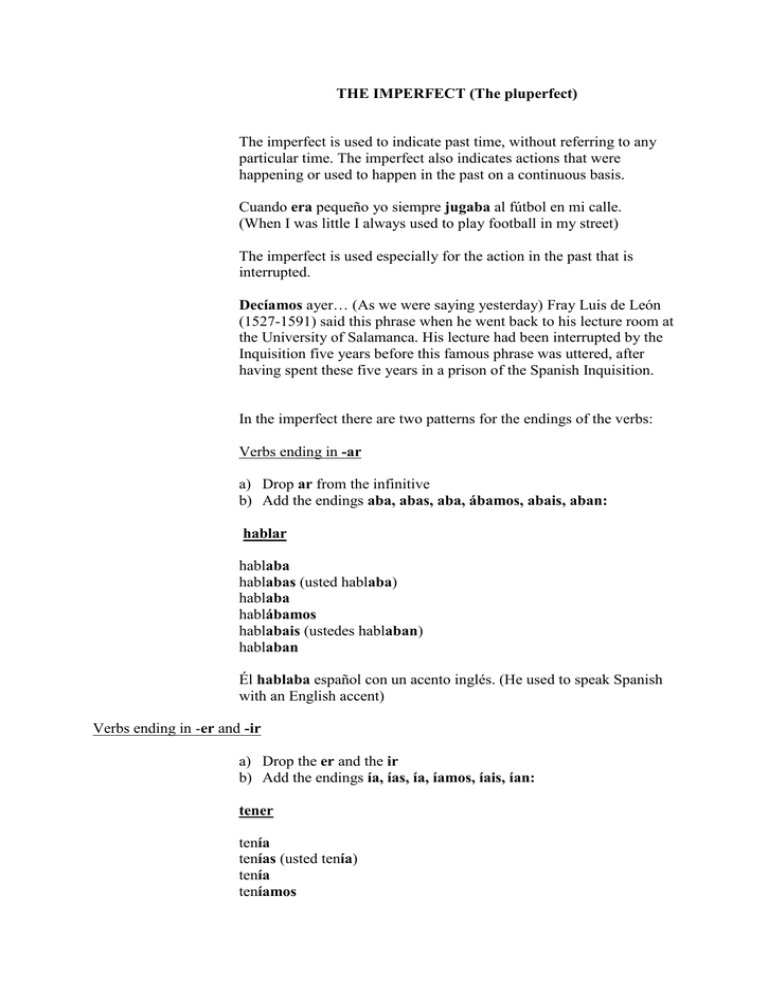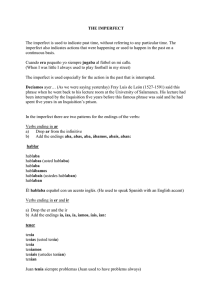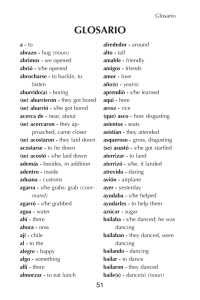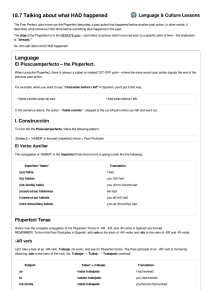THE IMPERFECT (The pluperfect) The imperfect is used to indicate
Anuncio

THE IMPERFECT (The pluperfect) The imperfect is used to indicate past time, without referring to any particular time. The imperfect also indicates actions that were happening or used to happen in the past on a continuous basis. Cuando era pequeño yo siempre jugaba al fútbol en mi calle. (When I was little I always used to play football in my street) The imperfect is used especially for the action in the past that is interrupted. Decíamos ayer… (As we were saying yesterday) Fray Luis de León (1527-1591) said this phrase when he went back to his lecture room at the University of Salamanca. His lecture had been interrupted by the Inquisition five years before this famous phrase was uttered, after having spent these five years in a prison of the Spanish Inquisition. In the imperfect there are two patterns for the endings of the verbs: Verbs ending in -ar a) Drop ar from the infinitive b) Add the endings aba, abas, aba, ábamos, abais, aban: hablar hablaba hablabas (usted hablaba) hablaba hablábamos hablabais (ustedes hablaban) hablaban Él hablaba español con un acento inglés. (He used to speak Spanish with an English accent) Verbs ending in -er and -ir a) Drop the er and the ir b) Add the endings ía, ías, ía, íamos, íais, ían: tener tenía tenías (usted tenía) tenía teníamos teníais (ustedes tenían) tenían Juan tenía siempre problemas (Juan always used to have problems) vivir vivía vivías (usted vivía) vivía vivíamos vivíais (ustedes vivían) vivían ...Quizás lo más admirable era su altísimo fundamento moral. Vivía mucho más avanzada que su época, además era tan noble y tan hermosa... (Pablo Casals, 1876-1973) (… Perhaps the most admirable thing was her very strong moral standards. She lived ahead of her times; besides, she was so honest and so beautiful…) In Spanish, there are only three irregular imperfects: 1) ver (to see) the endings are regular, but you drop just the r from the infinitive: veía veías (usted veía) veía veíamos veíais (ustedes veían) veían Le veía todos los domingos. (I used to see him every Sunday) 2) ir (to go) iba ibas (usted iba) iba íbamos ibais (ustedes iban) iban Íbamos a España en verano. (We used to go to Spain in the summer) 3) ser (to be) era eras (usted era) era éramos erais (ustedes eran) eran ¿Qué hora era? What time was it? Translating Problems Apart from the English „used to…‟ that is almost always translated by a Spanish imperfect, some of the other Spanish imperfects can be translated by a preterite or even by a conditional. Cuentan de un sabio, que un día tan pobre y misero estaba, que sólo se sustentaba de una hierbas que cogía. ¿Habrá otro –entre sí decíamás pobre y triste que yo? Y cuando el rostro volvió, halló la respuesta viendo que iba otro sabio cogiendo (was picking) las hojas que él arrojó. Life‟s a dream by Calderón de la Barca (1600-1681) lines 253-262 They say, there was once a sage, Who being so poor and miserable, Lived only on a few herbs, He would collect. One day he said to himself, “Is there any other man Poorer and sadder than myself?” But when he turned round, His words were answered, For he saw another sage Who was picking The leaves he‟d thrown away. Translated by Salvador Ortiz-Carboneres ********************** Ayer soñé que veía a Dios y que a Dios hablaba, y soñé que Dios me oía... Después soñé que soñaba. Antonio Machado (1875-1939) Yesterday I dreamed I was seeing God and, in my dream, I was talking to Him. I also dreamed that God could hear me. Finally, I dreamed that I was dreaming. Translated by Salvador Ortiz-Carboneres ********************** Cuando yo tenía dinero, me llamaban don Tomás, y ahora que no lo tengo, me llaman Tomás no más. When I had money, they used to call me don Tomás, and now that I don‟t have any, they call me Tomás, nothing else. Translated by Salvador Ortiz-Carboneres ************************* LA LIEBRE Y LA TORTUGA En cierta ocasión, una liebre y una tortuga apostaron para ver cuál de las dos corría más. Pronto la liebre con su rápida carrera dejó a la tortuga atrás. La tortuga sudaba y avanzaba despacio. La liebre, como iba tan adelantada, se echó a dormir junto a la meta. Cuando se despertó, vio con sorpresa que la tortuga había ganado. Esopo (620-564 BC) Note: la tortuga había ganado. – (the tortoise had won) – is a pluperfect. The pluperfect, also called the past perfect tense, is the compound past tense equivalent to the present perfect tense. Yo he perdido mi cartera – I have lost my wallet (perfect tense) Yo había perdido mi cartera y tuve que pedirle cien euros a mi padre – I had lost my wallet and I had to ask my father for one hundred euros (pluperfect) The action in the pluperfect is completed in the past. The Spanish pluperfect corresponds quite closely to the English pluperfect. It is formed in a similar way to the perfect tense, but instead of using the present of the auxiliary verb haber, we use its imperfect: había, habías (había), había, habíamos, habíais (habían), habían; plus the past participle of the main verb: Yo había trabajado muchas horas y estaba cansado – I had worked for many hours and I was tired. The Hare and the Tortoise A hare and a tortoise, one day, made a bet to see who could run faster. Soon the hare, with its fast running, left the tortoise behind. The tortoise, sweating, jogged along slowly. The hare, having gone ahead, lay down to take a nap near the finish. When the hare awoke, it saw, much to its surprise, that the tortoise had won. Translated by Salvador Ortiz-Carboneres *************************************************



